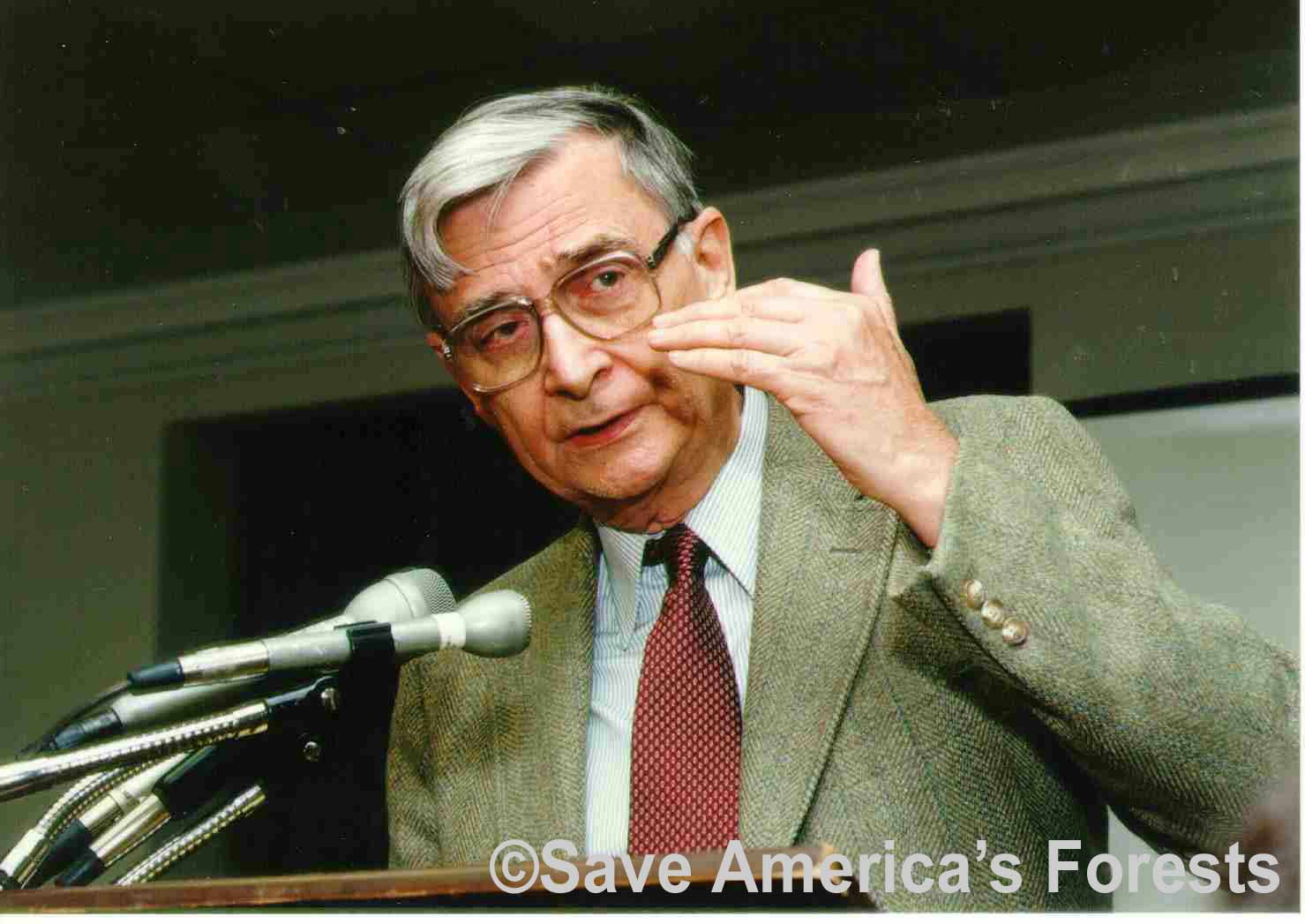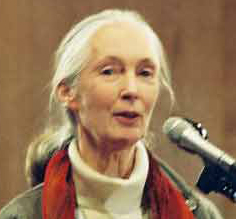|
E.O.Wilson:
Interview
on NBC
Radio
Dr.
E.O. Wilson on Preserving Biodiversity in the
National Forests and
the Act to Save America's Forests
AUDIO
Listen to the AUDIO
FILE (Please be patient while file downloads)
TRANSCRIPT—Read
the Interview
NBC Radio Host:
Edward Osborne Wilson is with us this morning; E.O.
Wilson to his students and colleagues, the renowned
biologist down from Harvard with a thing or two to
say to our representatives in Congress about preserving
America's ancient forests.
You and other scientists, Dr. Wilson, are lobbying
for no logging zones…is that it?… throughout
the national forests?
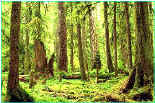 Dr.
Wilson: That's right, we need a more clear-cut
policy that draws a line to the save the last remnant
old forests of this country, only about 5% of the
original old growth forest of America are left. And
the reason why scientist are getting in on this is
not that they want to interfere in any way with the
ordinary timber industry of this country … but
they see the necessity of hanging on to that last
remnant, because that is one of America's greatest
natural resources. You could even say it's a large
part of our natural heritage, these forests go back
literally millennia, some of them probably millions
of years, and they contain a substantial part of the
fauna and the flora …the native fauna and flora
in great richness. And when the last of those are
cut, then they will never be recovered. But if we
hold on to them, then we will help to hold on to a
substantial part of America's native fauna and flora
and we will have them for recreation and we will have
them for still unimagined uses into the indefinite
future. It seems to me that it is not just an economic
issue to the long term but it is very much a moral
issue, that we now have legislation [The
Act to Save America's Forests: editor] to
draw the line and say look; lets leave that last little
bit alone. Dr.
Wilson: That's right, we need a more clear-cut
policy that draws a line to the save the last remnant
old forests of this country, only about 5% of the
original old growth forest of America are left. And
the reason why scientist are getting in on this is
not that they want to interfere in any way with the
ordinary timber industry of this country … but
they see the necessity of hanging on to that last
remnant, because that is one of America's greatest
natural resources. You could even say it's a large
part of our natural heritage, these forests go back
literally millennia, some of them probably millions
of years, and they contain a substantial part of the
fauna and the flora …the native fauna and flora
in great richness. And when the last of those are
cut, then they will never be recovered. But if we
hold on to them, then we will help to hold on to a
substantial part of America's native fauna and flora
and we will have them for recreation and we will have
them for still unimagined uses into the indefinite
future. It seems to me that it is not just an economic
issue to the long term but it is very much a moral
issue, that we now have legislation [The
Act to Save America's Forests: editor] to
draw the line and say look; lets leave that last little
bit alone.
NBC Radio Host: Well Dr. Wilson this is an
argument that perhaps the laymen might struggle with,
because you cut down a tree another one grows. We
know the argument with reference to the spotted owl
in the northwest, and there is also evidence that
shows that the spotted owl can do quite well in forests
other than the ancient forests. Why preserve the ancient
forest?
Dr. Wilson: Well it was unfortunate, as it
always is, to pivot any conservation argument on a
single species. What is at issue here is tens of thousand
of species that live together in closely integrated
communities. When you cut one of these forests you
are eliminating, not just a substantial part of the
population of a few species like the spotted owl,
but you are eliminating, with certainty, the entire
habitat of many, many other species…only some
of which have been studied by scientists at this point.
You cut it, and then you let it grow back, it is a
very different kind of a forest, particularly when
it is planted or when certain species of trees are
encouraged to grow as opposed to others. It becomes
increasingly a tree farm with turn over… and
you lose a large part of that tremendous assemblage
of animals and plants that are centered there and
which, in some cases, they are limited to that habitat.
 NBC
Radio Host: You lose something aesthetically too
don't you? NBC
Radio Host: You lose something aesthetically too
don't you?
Dr. Wilson: Well that is another point
NBC Radio Host: Of course
Dr. Wilson: Exactly…Right now…people…I
think most Americans appreciate the beauty of the
Grand Canyon, they appreciate the majesty of Washington's
mall, and they are just beginning to appreciate the
beauty and the majesty of America's biodiversity,
that is its fauna and flora…and to come to realize
that there is a great deal more to it than spotted
owl or even American eagles, there are tens of thousands
of species, many of them quite beautiful, some of
them obscure…all of them of great scientific
interest and a substantial portion of them of potential
economic interest to us as well.
NBC Radio Host: Would this bill [The
Act to Save America's Forests: editor] sponsored
by New Jersey democratic Senator Robert Torricelli
[currently sponsored by Senator Jon Corzine: editor],
would that be a big blow to industry? What would the
impact be of no logging zones on industry?
Dr. Wilson: This is not going to have a major
impact economically, what it does is call for the
last remnants to be protected by law in a clear-cut
manner, it then preserves this heritage and encourages
the timber industry to go on and cultivate what it
is already doing massively on land that is used for
timber…and to continue the practice of tree farming
in areas that otherwise that do not have this immense
value that the last remnants of our natural forests
posess.
NBC Radio Host: What does logging do to the
forest ecosystem…does it just totally destroy
it?
Dr. Wilson: Yes, it depends on the forest
itself, there are a few forests—they are not
the ones we are talking about here really—that
have relatively few species in them and they can grow
back rapidly. [editor: tree farms on private, not
public lands]
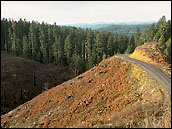 But
a great many of these forests are very vulnerable
and when you cut them, clear-cut them, that is what
the bill above all is trying to prevent in as much
area as can be defined as having these values that
I have been describing. When you clear-cut you do
drastically change the whole ecosystem…you…Just
think about it, for a substantial period of time when
you clear-cut you are not removing the dominant vegetation
but you are allowing …intense sunlight and the
strong air current to sweep through the remaining
undergrowth and the litter and the soil where so many
of these smaller plants and the animal forms exist
and those go…they go extinct. But
a great many of these forests are very vulnerable
and when you cut them, clear-cut them, that is what
the bill above all is trying to prevent in as much
area as can be defined as having these values that
I have been describing. When you clear-cut you do
drastically change the whole ecosystem…you…Just
think about it, for a substantial period of time when
you clear-cut you are not removing the dominant vegetation
but you are allowing …intense sunlight and the
strong air current to sweep through the remaining
undergrowth and the litter and the soil where so many
of these smaller plants and the animal forms exist
and those go…they go extinct.
NBC Radio Host: You've got a letter
in front of you, I think it is signed
by hundreds of scientists.
Dr. Wilson: 600.
NBC Radio Host: 600, will that have any impact
on our friends in Congress?
Dr. Wilson: Well I certainly hope so [laughing].
I mean, scientists don't often mobilize in this manner
but I have found that around the world the scientists
who specialize on biodiversity—you know, on the
study of the fauna and the flora and natural ecosystems—are
virtually unanimous in their support of this type
of measure [The
Act to Save America's Forests: Editor] and
their recognition that irreversible damage is being
done around the world, it is very important, I think
in addition, in terms of global significance, for
the United States to set the example- we are all bemoaning
the fate of the tropical rainforests, which are disappearing
at the rate of about ½% or 1% of their cover
a year with a devastating effect on the world's fauna
and flora because so many of the species of plants
and animals are found there, but we really don't have
much moral high ground to stand on as long as we proceed,
right in front of the whole world, to go ahead and
mow down the last of our old growth forests with a
large part of our own biodiversity.
NBC Radio Host: You know Dr. Wilson, there
is some good news here, in that young Americans are
much more attuned to the environment than then ever
were. I am a child of the sixties and we didn't think
that way. We didn't think of term of ecology and conservation
back then, to the extent that kids are now. I think
my point is that ecology and conservation is much
more accepted than it used to be. Even though you
still hear the pejorative term "tree huggers
". Are you a tree hugger?
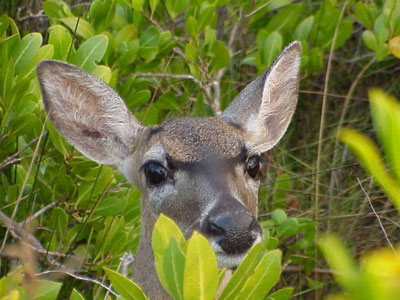 Dr.
Wilson: [laugh]…Yes… I don't nail spikes
into the trees I am certainly a tree hugger. I think
what we have here is a population that is gradually
turning around and recognizing…as you're quite
right…the new generations coming along become
more and more environmentalist because they know more,
they understand more. They realize that what we have
here is not a threat in saving the last of America's
natural environments. It is not a matter of imposing
some great cost on American society for the delectation
of a small group of people. But it is saving America's
heritage, and it's clearly a matter of aesthetics,
of value: it's a moral issue as well. And one that
I think is going to pay off handsomely in every aspect
of American life in the long term. Dr.
Wilson: [laugh]…Yes… I don't nail spikes
into the trees I am certainly a tree hugger. I think
what we have here is a population that is gradually
turning around and recognizing…as you're quite
right…the new generations coming along become
more and more environmentalist because they know more,
they understand more. They realize that what we have
here is not a threat in saving the last of America's
natural environments. It is not a matter of imposing
some great cost on American society for the delectation
of a small group of people. But it is saving America's
heritage, and it's clearly a matter of aesthetics,
of value: it's a moral issue as well. And one that
I think is going to pay off handsomely in every aspect
of American life in the long term.
NBC Radio Host: Well good luck in Washington,
as you traverse the political forest down here, hope
you don't get lost.
Dr. Wilson: Well, we need luck and all the
support we can get.
NBC Radio Host: On a personal note, you started
your career long ago in Alabama and then you went
up to Harvard and you've been closeted up in Cambridge
for the last forty some odd years…Tell us about
your research now.
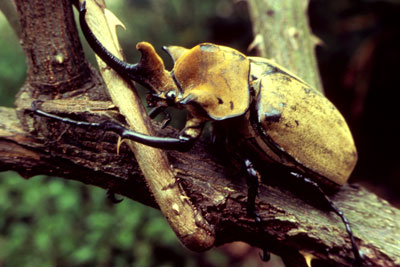 Dr.
Wilson: I began my research, in fact, in the outdoors,
I grew up in the beautiful woodlands, what is left
of them, in Alabama. And of course to that I owe my
deep personal interest in the environment. I studied
insects; I am an entomologist originally, particularly
the social insects. This led me to broad studies in
the evolution of social behavior up to and including
vertebrates and humanity…and that…I expanded
my interests to the diversity, diversification of
life, and the studies of ecosystems. And that is what
I now balance in my research interest. And I'm then
drawn out repeatedly from the closet, as you say,
to speak usually on behalf of the scientific community
on issues like the one before us today. Dr.
Wilson: I began my research, in fact, in the outdoors,
I grew up in the beautiful woodlands, what is left
of them, in Alabama. And of course to that I owe my
deep personal interest in the environment. I studied
insects; I am an entomologist originally, particularly
the social insects. This led me to broad studies in
the evolution of social behavior up to and including
vertebrates and humanity…and that…I expanded
my interests to the diversity, diversification of
life, and the studies of ecosystems. And that is what
I now balance in my research interest. And I'm then
drawn out repeatedly from the closet, as you say,
to speak usually on behalf of the scientific community
on issues like the one before us today.
NBC Radio Host: That is wonderful to have
your clear voice there and we thank you for it.
I am taking sides here…[Laugh]…aren't I,
but why not? I am a tree hugger too! Tell us about
your new book and then I'll let you go.
Dr. Wilson: Well, I am also in Washington
. . . as I did last night . . . to have a panel discussion
with a philosopher and a molecular biologist on the
prospect of the unification of knowledge…the
bringing together of science, the social sciences,
and the humanities…which is the subject of a
book I have just brought out with Knopf, which Knopf
called Consilience. And Consilience has made, I am
pleased to say, the New York Times Best-Seller List;
which is sort of an aberration for a book of ideas…to
get out there with books like Chicken Soup For The
Soul. And this is now also another major issue in
academia…is the relation of what we call the
great branch of the learning and the fate of the liberal
arts and the prospects of bringing them together and
teaching them effectively to students. But also in
designing future research projects and reconsidering
moral issues such as the ones we have been discussing:
the world's forests.
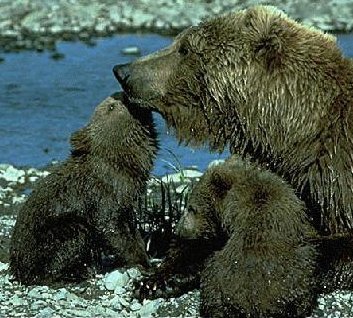 NBC
Radio Host: Consilience? NBC
Radio Host: Consilience?
Dr. Wilson: Yes, Consilience.
NBC Radio Host: Consilience
Dr. Wilson: Yes with an S
NBC Radio Host: I'll have to head to the bookstore.
Well Dr. Wilson thank you for joining us.
Dr. Wilson: Thank you.
NBC Radio Host: Good luck in Washington
transcript
of Radio
Interview—NBC
Radio—4.28.98
|

 Dr.
Wilson: That's right, we need a more clear-cut
policy that draws a line to the save the last remnant
old forests of this country, only about 5% of the
original old growth forest of America are left. And
the reason why scientist are getting in on this is
not that they want to interfere in any way with the
ordinary timber industry of this country … but
they see the necessity of hanging on to that last
remnant, because that is one of America's greatest
natural resources. You could even say it's a large
part of our natural heritage, these forests go back
literally millennia, some of them probably millions
of years, and they contain a substantial part of the
fauna and the flora …the native fauna and flora
in great richness. And when the last of those are
cut, then they will never be recovered. But if we
hold on to them, then we will help to hold on to a
substantial part of America's native fauna and flora
and we will have them for recreation and we will have
them for still unimagined uses into the indefinite
future. It seems to me that it is not just an economic
issue to the long term but it is very much a moral
issue, that we now have legislation [
Dr.
Wilson: That's right, we need a more clear-cut
policy that draws a line to the save the last remnant
old forests of this country, only about 5% of the
original old growth forest of America are left. And
the reason why scientist are getting in on this is
not that they want to interfere in any way with the
ordinary timber industry of this country … but
they see the necessity of hanging on to that last
remnant, because that is one of America's greatest
natural resources. You could even say it's a large
part of our natural heritage, these forests go back
literally millennia, some of them probably millions
of years, and they contain a substantial part of the
fauna and the flora …the native fauna and flora
in great richness. And when the last of those are
cut, then they will never be recovered. But if we
hold on to them, then we will help to hold on to a
substantial part of America's native fauna and flora
and we will have them for recreation and we will have
them for still unimagined uses into the indefinite
future. It seems to me that it is not just an economic
issue to the long term but it is very much a moral
issue, that we now have legislation [ NBC
Radio Host: You lose something aesthetically too
don't you?
NBC
Radio Host: You lose something aesthetically too
don't you? But
a great many of these forests are very vulnerable
and when you cut them, clear-cut them, that is what
the bill above all is trying to prevent in as much
area as can be defined as having these values that
I have been describing. When you clear-cut you do
drastically change the whole ecosystem…you…Just
think about it, for a substantial period of time when
you clear-cut you are not removing the dominant vegetation
but you are allowing …intense sunlight and the
strong air current to sweep through the remaining
undergrowth and the litter and the soil where so many
of these smaller plants and the animal forms exist
and those go…they go extinct.
But
a great many of these forests are very vulnerable
and when you cut them, clear-cut them, that is what
the bill above all is trying to prevent in as much
area as can be defined as having these values that
I have been describing. When you clear-cut you do
drastically change the whole ecosystem…you…Just
think about it, for a substantial period of time when
you clear-cut you are not removing the dominant vegetation
but you are allowing …intense sunlight and the
strong air current to sweep through the remaining
undergrowth and the litter and the soil where so many
of these smaller plants and the animal forms exist
and those go…they go extinct. Dr.
Wilson: [laugh]…Yes… I don't nail spikes
into the trees I am certainly a tree hugger. I think
what we have here is a population that is gradually
turning around and recognizing…as you're quite
right…the new generations coming along become
more and more environmentalist because they know more,
they understand more. They realize that what we have
here is not a threat in saving the last of America's
natural environments. It is not a matter of imposing
some great cost on American society for the delectation
of a small group of people. But it is saving America's
heritage, and it's clearly a matter of aesthetics,
of value: it's a moral issue as well. And one that
I think is going to pay off handsomely in every aspect
of American life in the long term.
Dr.
Wilson: [laugh]…Yes… I don't nail spikes
into the trees I am certainly a tree hugger. I think
what we have here is a population that is gradually
turning around and recognizing…as you're quite
right…the new generations coming along become
more and more environmentalist because they know more,
they understand more. They realize that what we have
here is not a threat in saving the last of America's
natural environments. It is not a matter of imposing
some great cost on American society for the delectation
of a small group of people. But it is saving America's
heritage, and it's clearly a matter of aesthetics,
of value: it's a moral issue as well. And one that
I think is going to pay off handsomely in every aspect
of American life in the long term. Dr.
Wilson: I began my research, in fact, in the outdoors,
I grew up in the beautiful woodlands, what is left
of them, in Alabama. And of course to that I owe my
deep personal interest in the environment. I studied
insects; I am an entomologist originally, particularly
the social insects. This led me to broad studies in
the evolution of social behavior up to and including
vertebrates and humanity…and that…I expanded
my interests to the diversity, diversification of
life, and the studies of ecosystems. And that is what
I now balance in my research interest. And I'm then
drawn out repeatedly from the closet, as you say,
to speak usually on behalf of the scientific community
on issues like the one before us today.
Dr.
Wilson: I began my research, in fact, in the outdoors,
I grew up in the beautiful woodlands, what is left
of them, in Alabama. And of course to that I owe my
deep personal interest in the environment. I studied
insects; I am an entomologist originally, particularly
the social insects. This led me to broad studies in
the evolution of social behavior up to and including
vertebrates and humanity…and that…I expanded
my interests to the diversity, diversification of
life, and the studies of ecosystems. And that is what
I now balance in my research interest. And I'm then
drawn out repeatedly from the closet, as you say,
to speak usually on behalf of the scientific community
on issues like the one before us today.  NBC
Radio Host: Consilience?
NBC
Radio Host: Consilience? 